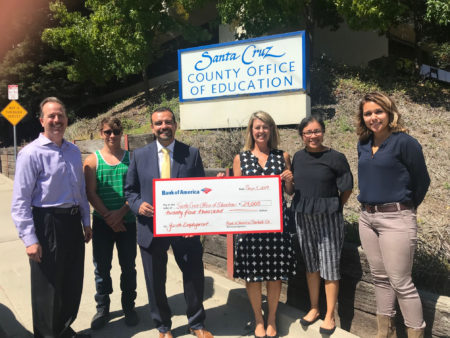
Ten local teens from disadvantaged backgrounds recently participated in paid summer internships with the Santa Cruz County Office of Education (Santa Cruz COE) under its Summer Youth Employment Program (SYEP). This is the third year the program has been offered, funded through more than $76,000 in grants from Bank of America, that has so far employed 30 teens in the unincorporated Santa Cruz County, California, as well as the cities of Capitola, Santa Cruz, Scotts Valley and Watsonville.
The SYEP was designed to fill the gap for students who did not qualify for other work programs. In 2019, with the assistance from the first Bank of America grant, the Santa Cruz COE reinstituted the dormant paid program to support teens ages 15 – 19 experiencing foster care, homelessness, at risk of gang involvement, mental health challenges, juvenile justice involvement and truancy. All participants are connected to, and referred from, one of SCCOE’s various at-risk/promise youth programs.
“Job-readiness training and mentoring coupled with a paid position offers significant incentives and a robust array of vital resources to support these vulnerable youth,” explains Dr. Michael Paynter, Director of the Student Support Services Department at the Santa Cruz COE.
“Youth employment is a priority for Bank of America, connecting young adults to early workforce skills along with access to potential career opportunities and financial stability,” said Jennifer Dacquisto, President, Bank of America Monterey Bay. “Partnering with the Santa Cruz County Office of Education’s summer youth employment program provides these teens with mentorship, counseling, and support to prepare them for future success.”
SYEP employs each teen for 100 hours of paid work experience, along with additional mentoring, pre-employment skills training and career exploration. Pre-pandemic, SYEP participants worked onsite at various government, nonprofit, and private sector offices and shops. With Covid-19, the program shifted to a virtual format, which allowed the roles to expand by working within multiple student engagement, leadership and advocacy groups focused on a number of issues in their community, from racial justice to integration of the arts in education to environmental advocacy and more. This distance learning format has helped the SYEP to evolve.
There are plans to further expand the range of students and complex work experiences that are part of the program, maintaining the best of both worlds, and preparing the next generation for the hybrid nature of the post-pandemic workforce landscape.
The Santa Cruz COE operates numerous initiatives for students facing significant challenges, including the gang prevention program BASTA, the homeless youth advocacy program, the Foster Youth Services Coordinating Program and Teen Peer Court, among others. Each of these offerings strives to wrap students in multiple layers of support from mentors and behavioral health services to educational and career opportunities.
